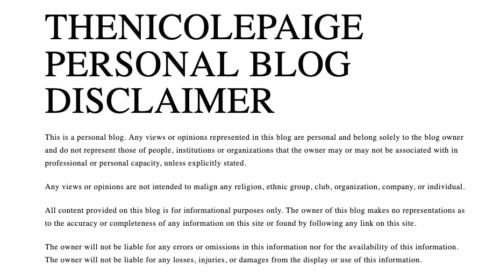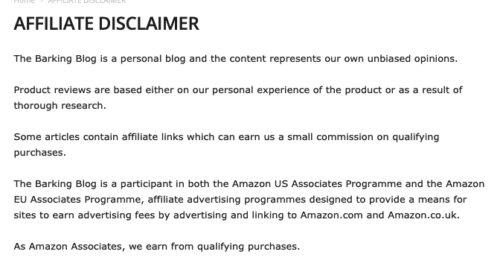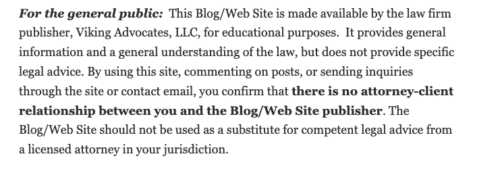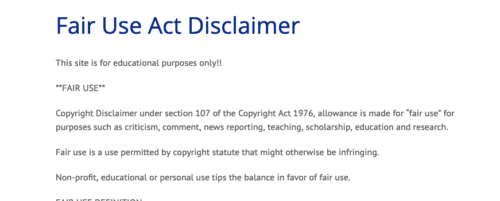The Data Protection Act (DPA) 2018 is the UK's updated data protection law which became effective on 25th May 2018 and was recently amended on the 1st January 2021 to reflect the United Kingdom's exit from the EU. It sits alongside the UK GDPR and replaces the Data Protection Act 1998. The United Kingdom is […]
Blog Disclaimer with Examples
A blog disclaimer is a legal statement that helps to protect you, the blogger, from legal liability associated with the content on your blog. There is not a one size fits all disclaimer for blogs as they vary greatly on topics. However there are a few disclaimers that are commonly used on blogs so let's take a look into what these are and some examples of them.

On this page
What is a Blog Disclaimer?
Since blogging is not a one size fits all industry, the disclaimers that you will require as a blogger are not one size fits all. Having the correct disclaimers on your blog is an important aspect of limiting your legal liability when you are sharing information online.
But what is a disclaimer? A disclaimer is a legal statement that lets your readers know that you cannot be held liable for the content you are providing and also discloses that you are a part of an affiliate program (if you are).
The most common blog disclaimers include the following:
- Blog Disclaimer: a general disclaimer for personal blogs.
- Affiliate Disclaimer: if your website contains affiliate links then you need an affiliate disclaimer.
- No Professional Relationship Disclaimer: if your blog discusses professional topics such as law, medicine or fitness, then you may want to add this disclaimer.
- Fitness, Medical or Legal Disclaimer: specific disclaimers written for these topics.
- Fair Use Disclaimer: A disclaimer if your blog uses copyrighted material and you believe you are complying with "fair use" of the material.
Let's take a closer look at each of these disclaimers.

Blog Disclaimer
A blog disclaimer is a general disclaimer that's useful for personal blogs. It helps minimize legal liability of your website content and lets your readers know that your posts are for informational purposes only. The blog disclaimer states that you are not liable for any injuries or damages for the use of your information.
An example of a personal blog disclaimer is the one below from thenicolepaige.com blog

Affiliate Disclaimer
If your blog contains affiliate links then you must comply with the FTC’s policy and include an affiliate disclaimer. For example as a part of Amazons Associates programs operating agreement you must clearly identify yourself on your site as below.

An example of an affiliate disclaimer can be seen in this example from the Barking Blog

No Professional Relationship Disclaimer
If your blog provides information on a professional topic such as law, medicine, fitness or counselling then you may want to consider adding this disclaimer. A no professional relationship disclaimer lets your users know that your website content is not a substitute for professional advice. It explains that by your readers using your website their is no professional relationship between you and them. Your website content is provided for informational purposes only.
Here is an example of a no professional relationship disclaimer from Be Here and Now

Fitness, Medical or Legal Disclaimers
If your blog discusses topics relating to medicine, health, fitness or anything legal then including the appropriate disclaimer on your blog is good practice.
Each of these disclaimers will help reduce legal liability when you are discussing these topics.
The following example is taken from Hague Law Blog

Fair Use Disclaimer
The fair use disclaimer is for use by bloggers who may be using copyrighted material on their blog. In section 7 of US Copyright Law, you are able to use some copyrighted material for educational and teaching purposes. If you use or believe that you may be using copyrighted material then adding the fair use disclaimer to your blog is good practice.
The following has been taken from the Fair Use Disclaimer on the Multiple Chronic Conditions Resource Center website.

Conclusion
As a blogger you are sharing information and your opinions with your readers. A disclaimer does help to limit your legal liability when you are posting content. There are a number of disclaimers that are useful to bloggers and these include a blog disclaimer, an affiliate disclaimer, no professional relationship disclaimer, a fitness, medical or legal disclaimer of appropriate and a fair use disclaimer.
For peace of mind it really is worth adding the appropriate disclaimers to your blog and reducing your chance of legal liability.
Disclaimer
The information in this article is for informational purposes only and should not be construed as legal advice on any matter and does not create a lawyer-client relationship
